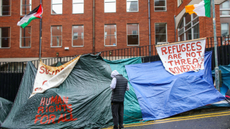Ten Things You Need to Know Today: 16 Feb 2021
The Week’s daily digest of the news agenda, published at 8am
- 1. PM plans ‘final lockdown’ exit
- 2. Cummings ‘gave friends contract’
- 3. Pandemic rent crisis
- 4. Oprah bags Harry and Meghan
- 5. US ‘outraged’ by rocket attack
- 6. Vaccine rollout causing fall in cases
- 7. LGBT troops can reclaim medals
- 8. Testing could re-open nightclubs
- 9. Pandemic may reduce coin use
- 10. College offers small talk course
1. PM plans ‘final lockdown’ exit
Boris Johnson has said that he wants the current lockdown to be the last. Speaking at the daily Covid press briefing, the prime minister said the easing of restrictions, due to be announced next Monday, should be “cautious but irreversible”, adding: “I think that is what the public, people up and down the country, want to see.” Johnson said that he would continue to review the data right up to the announcement, but The Telegraph says hopes of a “rapid reopening in time for Easter” have been “dampened”.
The three scenarios being drawn up by ministers for ending Covid lockdown
2. Cummings ‘gave friends contract’
The Cabinet Office has been accused of misleading the public after it emerged that Dominic Cummings was instrumental in the awarding of a government contract to a company run by two “friends”. Court documents show the pivotal role the prime minister’s former chief adviser played in the awarding of a Covid research contract to Public First, a company owned and run by two of his longstanding associates. Public First was paid £564,393 to research the public’s understanding of the coronavirus and the government’s messaging around the pandemic.
Subscribe to The Week
Escape your echo chamber. Get the facts behind the news, plus analysis from multiple perspectives.

Sign up for The Week's Free Newsletters
From our morning news briefing to a weekly Good News Newsletter, get the best of The Week delivered directly to your inbox.
From our morning news briefing to a weekly Good News Newsletter, get the best of The Week delivered directly to your inbox.
Firm with links to Michael Gove and Dominic Cummings handed Ofqual A-level contract
3. Pandemic rent crisis
Almost half a million more families have fallen behind on rent during the Covid-19 crisis, a new study has revealed. The Resolution Foundation think tank found that more than 750,000 people were behind on housing costs last month, 450,000 more than in the same month last year. “Despite widespread calls for forbearance in the face of the Covid-19 shock, just 3% of private renting families have been able to negotiate a lower rent,” it said. Meanwhile, one in 20 private renters said they had been refused rent reductions.
Eviction ban: what are renters’ rights under new coronavirus law?
4. Oprah bags Harry and Meghan
The Duke and Duchess of Sussex are to give their first in-depth television interview since stepping back from Royal duties to Oprah Winfrey. Prince Harry and Meghan Markle are expected to tell the chat show host why they walked away from the monarchy in a 90-minute special to be shown on the US network CBS in March. Palace officials were given no warning of the interview and The Times says Buckingham Palace is “bracing itself” for further revelations.
What Meghan Markle’s court win means for Royal Family - and the media
5. US ‘outraged’ by rocket attack
Washington has vowed to “hold accountable those responsible” for a rocket attack in the capital of Iraqi Kurdistan that killed a civilian contractor. A US service member and five other contractors were injured when rockets hits sites in Irbil yesterday. Secretary of State Antony Blinken said Washington was “outraged” by the attack. A little-known pro-Iranian Shiite militia known as The Guardians of Blood Brigades has claimed responsibility, saying it had targeted “the American occupation”.
6. Vaccine rollout causing fall in cases
The ongoing vaccination campaign is already reducing hospital admissions, deaths and transmission of Covid-19 in Britain, according to early data. Boris Johnson said that there were “interesting straws in the wind” and “grounds for confidence” on vaccines cutting the spread of infection. Studies of elderly people and healthcare workers are also showing “encouraging” news, The Times reports. However, government sources stressed to the paper that any emerging data is only preliminary.
How many people need to be vaccinated to get life back to normal?
7. LGBT troops can reclaim medals
Former military personnel dismissed from the armed forces because of their sexuality can now reclaim lost medals. After the Falklands veteran Joe Ousalice’s successful bid to return awards he lost after being forced out of the Royal Navy, a new scheme has been launched under which former service personnel can apply to the Ministry of Defence (MoD) to restore their honours. The MoD admitted that its past actions were “deeply regrettable”, while Conservative MP Johnny Mercer, the veterans minister, said the announcement “addresses a historic injustice”.
What Boris Johnson has planned for his £16bn military spending spree
8. Testing could re-open nightclubs
Speedy Covid-19 testing could enable nightclubs and theatres to reopen soon, Boris Johnson has suggested. Speaking at the daily Covid press briefing, the PM said “rapid” lateral flow tests could be used by “those parts of the economy we couldn’t get open last year”. Nightclubs have been unable to operate since March 2020, while many theatres have struggled to make social distancing work. A ministerial source moved to temper expectations, adding: “There is a long way to go before we can get people back at big events safely.”
Is a second wave of rave sparking new Covid outbreaks across Europe?
9. Pandemic may reduce coin use
The use of coins could drop by one-fifth after the pandemic, the chief executive of the Royal Mint has claimed. Anne Jessopp told The Telegraph that the future “will be less cash, but not cashless” after a fall in the use of coins and a move towards online payments over the past 12 months. “Sometimes when times are tough for people financially they go back to cash,” she said. “I think the one thing that the pandemic has told us is we can’t predict the future anymore.”
Pros and cons of ditching cash for contactless
10. College offers small talk course
A university is offering students what is believed to be the first module in chit-chat and networking. BPP University Law School has hired Georgie Nightingall, founder of Trigger Conversations, to help students have “good conversations” that “expand your perspectives and your relationships”. The university decided to launch the class after a poll found that 43% of its students feared they would be judged by the way they speak during their legal careers.
Create an account with the same email registered to your subscription to unlock access.
Sign up for Today's Best Articles in your inbox
A free daily email with the biggest news stories of the day – and the best features from TheWeek.com
-
 5 high-caliber cartoons about Kristi Noem shooting her puppy
5 high-caliber cartoons about Kristi Noem shooting her puppyCartoons Artists take on the rainbow bridge, a farm upstate, and more
By The Week US Published
-
 The Week Unwrapped: Why is the world running low on blood?
The Week Unwrapped: Why is the world running low on blood?Podcast Scientists believe universal donor blood is within reach – plus, the row over an immersive D-Day simulation, and an Ozempic faux pas
By The Week Staff Published
-
 Rishi Sunak's asylum spat with Ireland explained
Rishi Sunak's asylum spat with Ireland explainedIn Depth Irish government plans to override court ruling that the UK is unsafe for asylum seekers
By The Week UK Published
-
 10 things you need to know today: January 24, 2024
10 things you need to know today: January 24, 2024Daily Briefing Trump closes in on nomination with New Hampshire win over Haley, 'Oppenheimer' leads the 2024 Oscar nominations, and more
By Harold Maass, The Week US Published
-
 10 things you need to know today: January 23, 2024
10 things you need to know today: January 23, 2024Daily Briefing Haley makes last stand in New Hampshire as Trump extends polling lead, justices side with US over Texas in border fight, and more
By Harold Maass, The Week US Published
-
 10 things you need to know today: January 22, 2024
10 things you need to know today: January 22, 2024Daily Briefing DeSantis ends his presidential campaign and endorses Trump, the US and Arab allies push plan to end Gaza war, and more
By Harold Maass, The Week US Published
-
 10 things you need to know today: January 21, 2024
10 things you need to know today: January 21, 2024Daily Briefing Palestinian death toll reportedly passes 25,000, top Biden adviser to travel to Egypt and Qatar for hostage talks, and more
By Justin Klawans, The Week US Published
-
 10 things you need to know today: January 20, 2024
10 things you need to know today: January 20, 2024Daily Briefing Grand jury reportedly convened to investigate Uvalde shooting response, families protest outside Netanyahu's house as pressure mounts for hostage deal, and more
By Justin Klawans, The Week US Published
-
 10 things you need to know today: January 19, 2024
10 things you need to know today: January 19, 2024Daily Briefing Congress averts a government shutdown, DOJ report cites failures in police response to Texas school shooting, and more
By Harold Maass, The Week US Published
-
 10 things you need to know today: January 18, 2024
10 things you need to know today: January 18, 2024Daily Briefing Judge threatens to remove Trump from his defamation trial, medicine for hostages and Palestinians reach Gaza, and more
By Harold Maass, The Week US Published
-
 10 things you need to know today: January 17, 2024
10 things you need to know today: January 17, 2024Daily Briefing The US strikes Houthi targets in Yemen a third time, Trump's second sex defamation trial begins, and more
By Harold Maass, The Week US Published